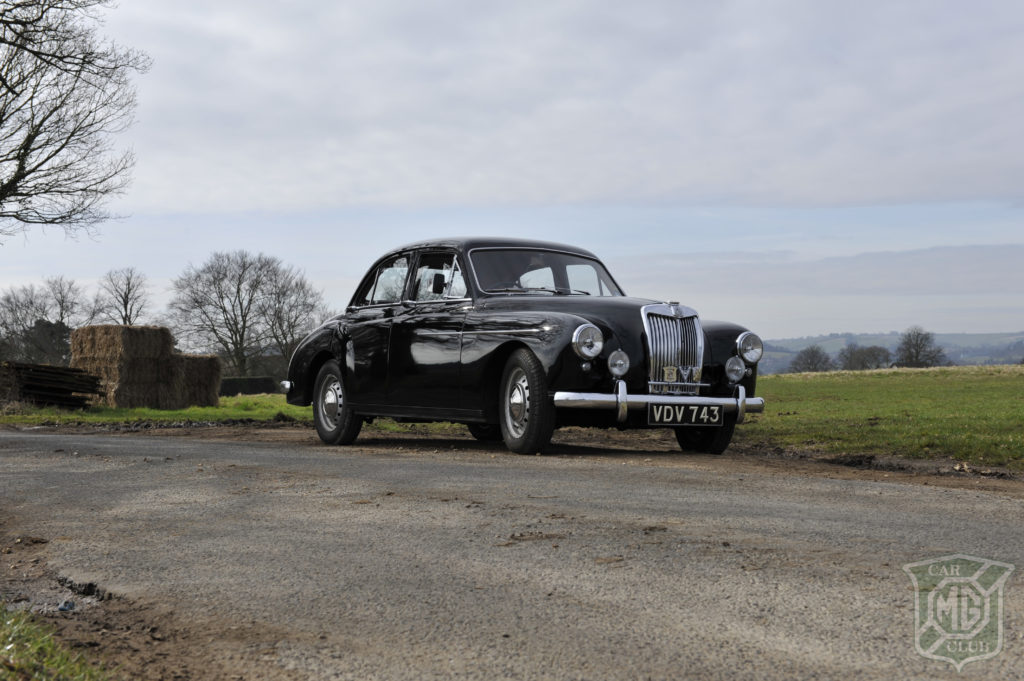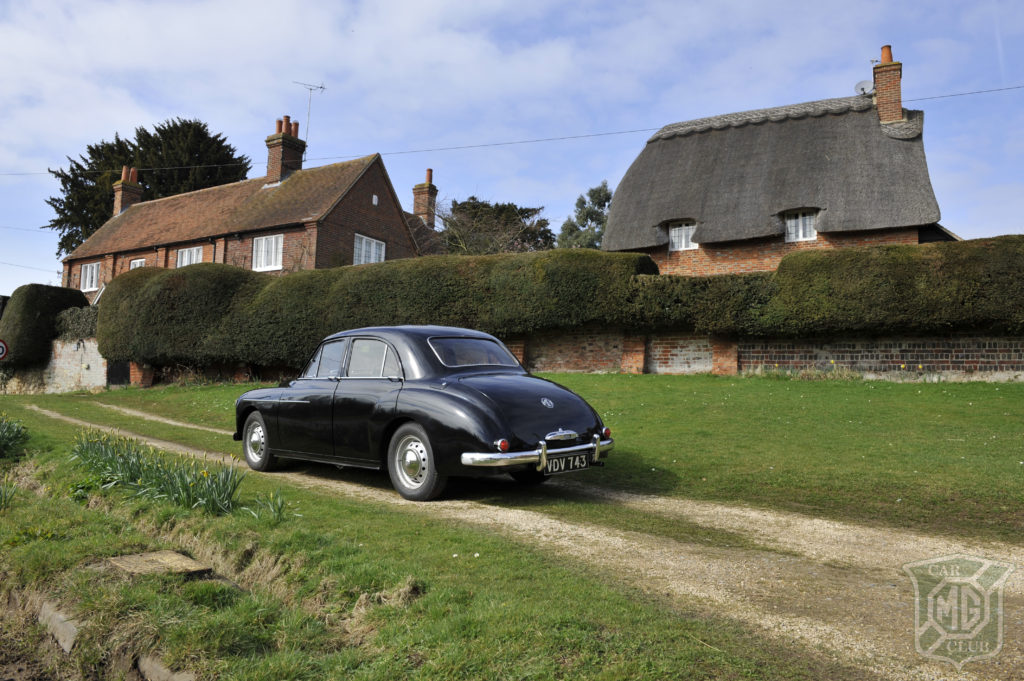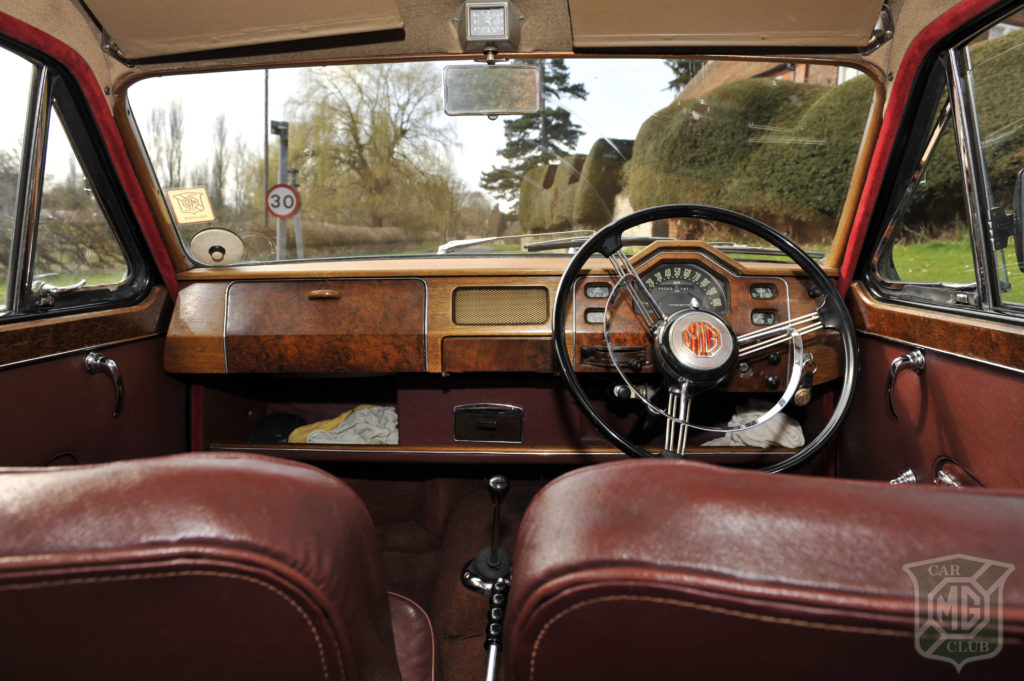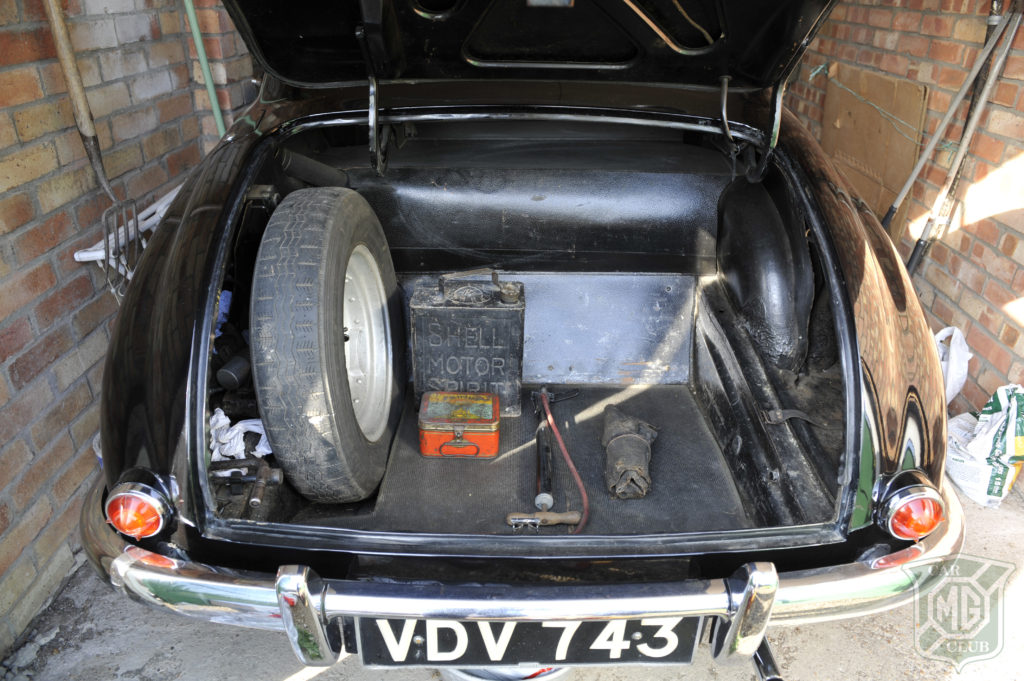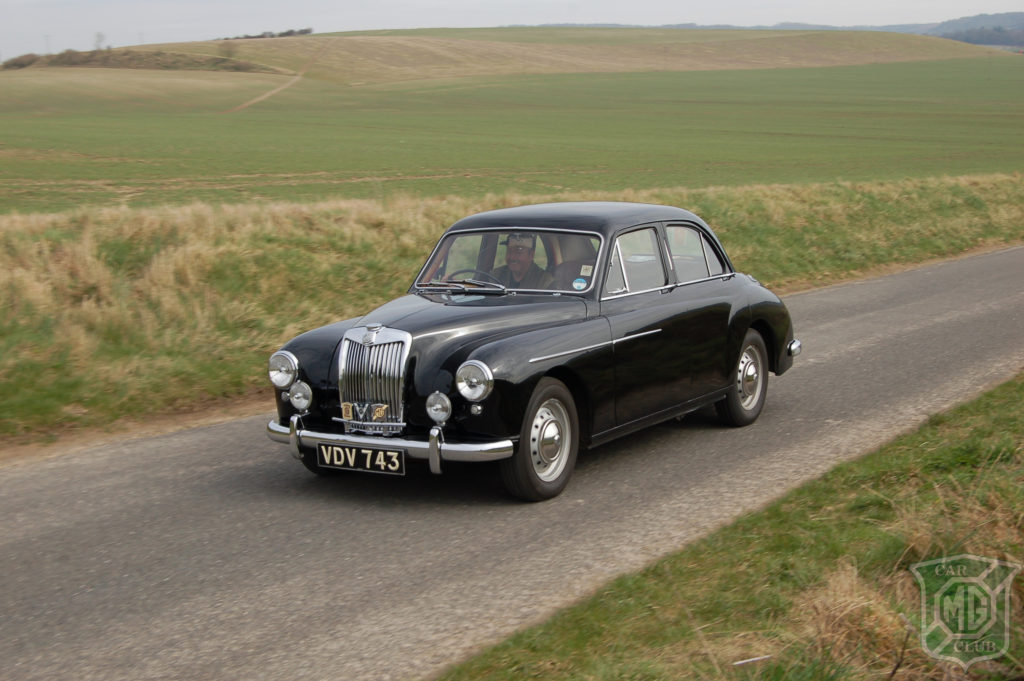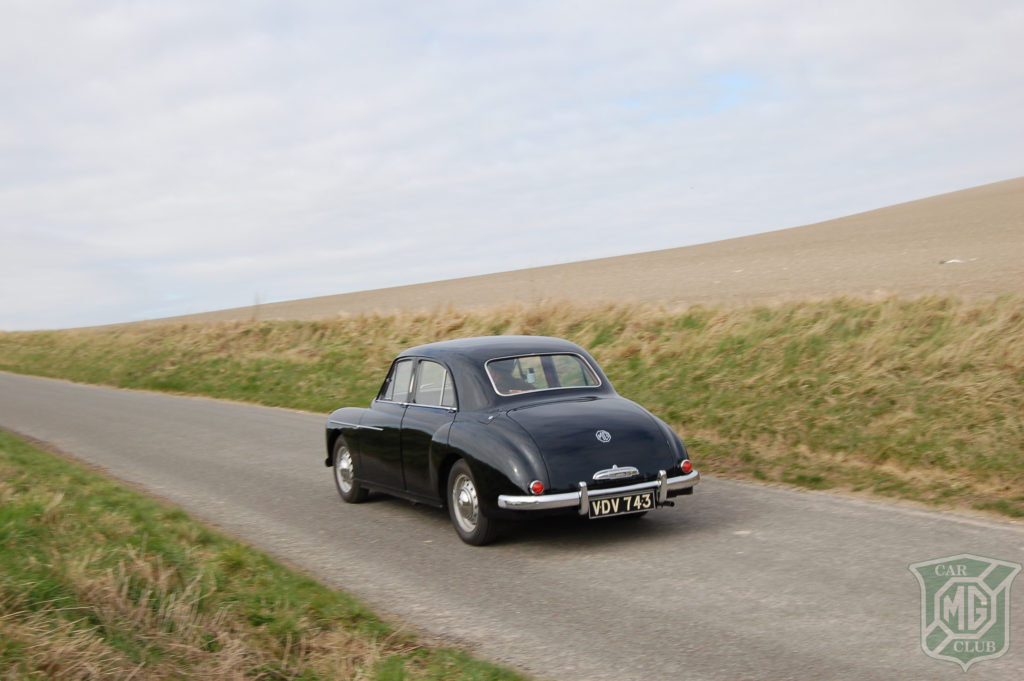Magnetic Attraction
By Colin Grant
I recently met a good friend of mine Chris at his local for a drink. He lives in a picturesque village in Oxfordshire where the pub still retains a lot of that old country character. After purchasing two pints of their best bitter, the talk soon got round to MG’s and in particular his 1957 MG Magnette ZB. His father had purchased this car, his third Magnette in 1976 when he became only the third owner and the car has been in the family ever since.
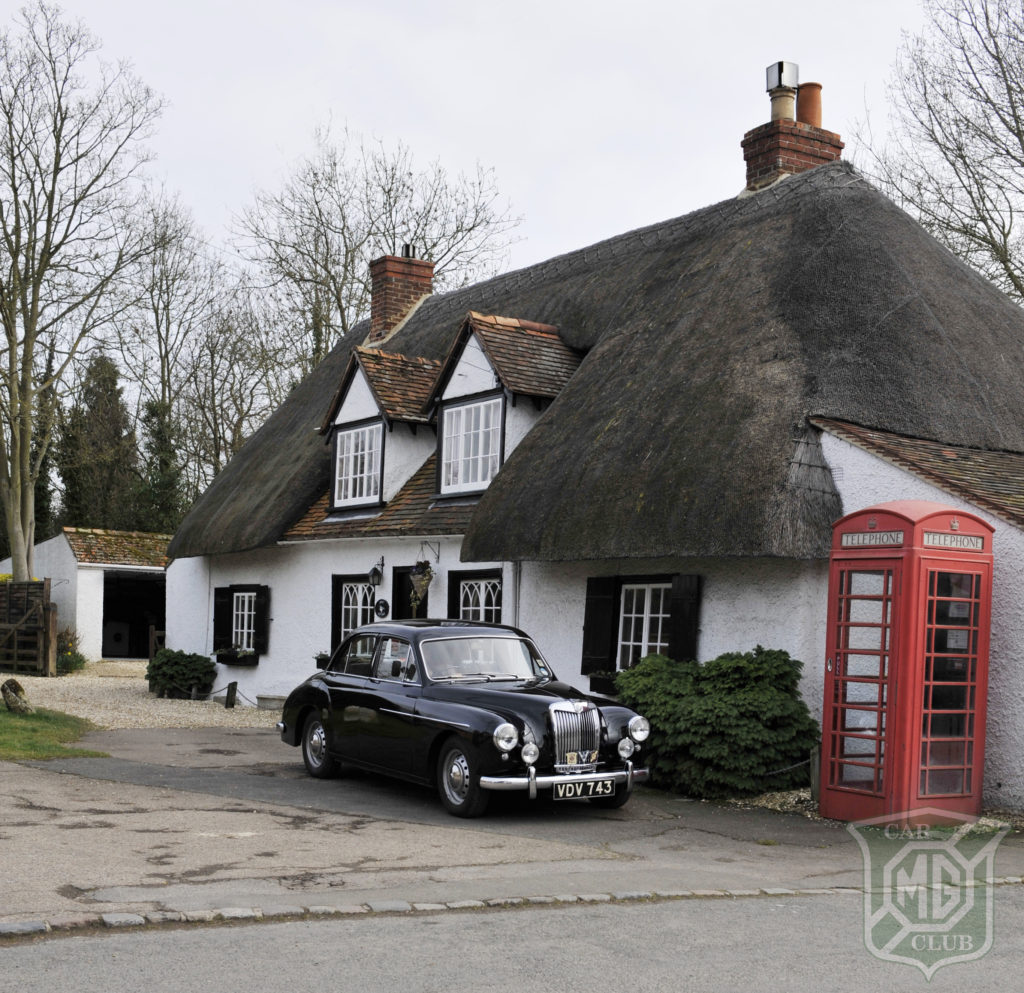
The only bodywork repairs to be carried out during the cars lifetime so far, were having the sills replaced in the 1980’s and a respray in its original colour of black. Amazingly the car has only covered a little over 50,000 miles on its original engine. This being confirmed when contact was made with the original owners daughter. She mentioned that the Speedo had been replaced a few years after her father had purchased the car, her father had written the mileage of the original Speedo in yellow crayon on the underside of the bonnet, something that had always been a mystery up to then.
She explained that if he added this to the mileage on the existing Speedo (providing it was still original, which it was) then that would give the total mileage of the car. The original owner was a Mr William Pugsey of Lynmouth in Devon; he sold the car in early 1976 to a gentleman who only owned the car for a few months selling it to a dealer in Banbury from where chris’ father purchased it.
I mentioned that we were looking for a Magnette to be featured in the April issue of Safety Fast, which would be celebrating fifty years of publication. He readily agreed to loan us the Magnette and arrangements were made to meet up the following week.
On arrival Chris took me to his workshop and opened up the doors to show me the gleaming ZB Magnette. The chrome work looked excellent and is all original, as are the maroon leather seats and red carpet, which shows only slight signs of wear for its age. The car started on the button, and as it was reversed out of the garage I noted how nice the engine sounded. We headed out to Brightwel-cum-Sotwell, a small village situated near Wallingford, which has lots of character and many period cottages.
The car pulled effortlessly, although I did find that first was fairly low geared, and that you could start off in second if you wished. The engine is the well-known B-series unit of 1489cc. It produces 69 b.h.p at 5,400 r.p.m. and has a higher rear axle ratio employed over the older ZA model. The driving position is very good, with a large 17in plastic rimmed wire sprung steering wheel, centre embossed with the MG logo. In front of you is a well laid out dash consisting of Speedo, fuel, ammeter, oil, and temperature gauges, all mounted in a wooden surround.
Look upwards above the rear view mirror and you have a lovely sculptured clock, with black face and luminous hands. The dash is all sculpted from wood, including the top panel which on the very early ZA’s was of a metal pressing. The gear lever falls easily to hand as does the hand brake, which is situated between the luxurious seats. On moving off the clutch is smooth and grips well after each pleasurable gear change.
Once on the move progress is swift with 23mph available in first, 40 in second, 70 in third and a top speed of around 87mph. A 0-60mph time of 18 seconds has been quoted in a 1957 road test although our progress was more sedate. My everyday car is an MGF, which has an excellent brake set up, so I did find the braking on the ZB to be, well, interesting. With no servo and drum brakes all round a fair amount of pressure is required on the brake pedal to bring the car to a halt, but it did pull up squarely with no pulling to one side.
The route consisted of quite a few bends, which gave me the chance to find out the handling characteristics of the car. To my surprise I found the car had very little roll unless pushed hard into a bend, with the steering being very precise, as you would expect from its rack and pinion set up. One concession to the modern age on this car is the use of radial ply tyres over the cross ply’s originally fitted, which I’m told enhance the road holding immensely. The Magnette is a heavy car weighing in at 22cwt, although it does not give the impression of this whilst on the move.
The four-door saloon body is easy to enter and carriers four people with ease. In the back I found I had more than ample head room and leg room, even with the drivers seat pushed well back. Storage is excellent with a large compartment built into the dash that is accessed by opening a wooden door. A shelf runs the width of the car under the dash area, and another shelf sits below the rear window. The boot has an impressive amount of space in which you could easily load several suitcases and accessories for a family holiday. The ambiance inside the car is what you would expect from a car of this era and oozes quality, with wood, leather, and that smell which you only get in old cars. If only we could bottle this!
Our journey took us to the village of Clifton Hampden where so many of the early MG publicity photos were taken. The first thing I noticed when we came to a T-junction, and I indicated right, was the lack of the ticking noise we get on cars with flashing indicators. This was because this car still has its original semaphore direction indicators, something that was a little dated even in 1957.
On entering Clifton Hampden, we passed the Barley Mow public house made famous by the Jerome K. Jerome’s book ‘Three men in a boat’ and took a left turn where we came upon those lovely cottages that featured so often in the early marketing brochures. After a couple of photos we made our way towards the village of Goring on Thames using the Ipsden road from Crowmarsh. This is a lovely road to try out a car with long sweeping bends and very little traffic. We did top 60 along this road with ease with the car feeling remarkably stable.
All too quickly the test came to an end and we wound our way back to Chris’s workshop.
My opinion of the MG Magnette is one of a well-made luxury car with lovely sweeping lines that are just as attractive today as they were in the fifties. The handling, braking and performance do not make it difficult to drive in modern traffic in fact just the opposite.
Would I like to own one, you bet!
Specification and Performance data
The Gerald Palmer designed Magnette was produced between 1953 and 1959, in ZA, ZB, and Varitone versions. Over 36,000 were produced.
Car Tested: 1957 MG Magnette four door saloon. Price new £1,072.
Engine: Four cylinder pushrod B Series engine of 1,489cc capacity.
Compression ration 8.3 to 1, 69 bhp at 5,400 rpm. Twin SU 1 ½” carburettors.
Transmission: Single dry plate clutch with four speed gearbox driving an open prop shaft and hypoid rear axle.
Chassis Combined pressed steel body and chassis. Independent front suspension, rack and pinion steering rigid rear axle on semi elliptic springs. Piston type dampers all round. Lockheed hydraulic drum brakes with bolt on disc wheels
Equipment: 12 volt lighting and starting. Clock, Speedometer, oil pressure, fuel, ammeter and temperature gauges. Wipers and washers, heating and demisting.
Dimensions: Wheelbase 8ft 6ins. Track 4ft 3ins, Overall length 14ft 1in, width 5ft 3in, turning circle 37.5ft.
Performance: Maximum speed 87mph. 0-60mph 18 seconds
Fuel consumption: approx 26mpg
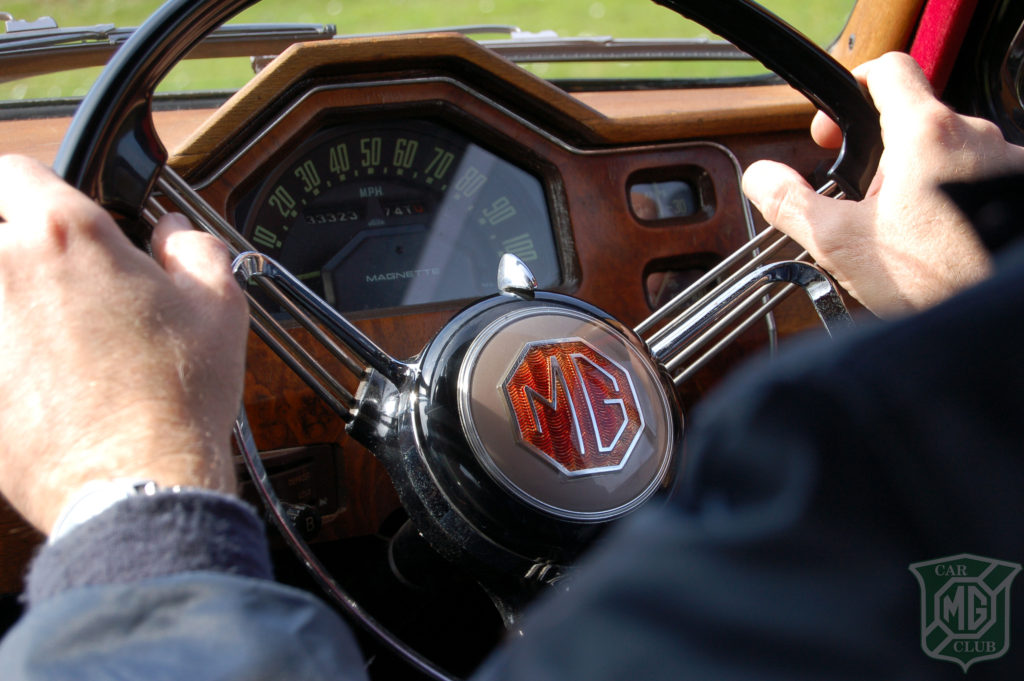
Chris has run Chris Lewis Engineering, since 1982 and has built up a regular customer base in servicing and repair work on most types of cars. Chris has restored several MG’s for customers over the years including a rubber bumper MGB GT that we purchased together and restored in the late 1980’s. Chris actually learnt to drive in his fathers Magnette ZB Varitone in 1965.
A point of interest is that Chris runs his business from a converted Methodist Chapel, which was built in 1839 and used up to 1966. Chris father purchased the Chapel in 1968 and Chris set up his business there in 1982. The Chapel is situated at the bottom of his garden.

 MG Car Club
MG Car Club